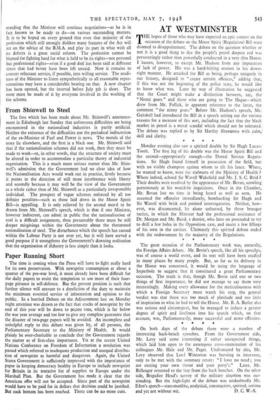From Shinwell to Steel
The fuss which has been made about Mr. Shinwell's announce- ment in Edinburgh last Sunday that unforeseen difficulties are being encountered in the nationalised industries is partly artificial. Neither the existence of the difficulties nor the periodical indiscretion of the ex-Minister of Fuel and Power is news. The morals of the story lie elsewhere, and the first is a black one. Mr. Shinwell said that if the nationalisation schemes did not work, then they must be made to work—or, in other words, that the structure of society must be altered in order to accommodate a particular theory of industrial organisation. This is a much more serious matter than Mr. Shin- well's admission that the Government had no clear idea of how the Nationalisation Acts would work out in practice, firstly because it points in the direction of still more interference with liberty and secondly because it may well be the view of the Government as a whole rather than of Mr. Shinwell as a particularly irresponsible individual. The prospect of vague schemes enforced by all too definite penalties—such as those laid down in the Motor Spirit Bill—is appalling. It is only relieved by the second moral to be drawn from Mr. Shinwell's speech, which is that if one Minister, however indiscreet, can admit in public that the nationalisation of coal is a difficult assignment, then presumably there must be, still deeper misgivings within the Government about the threatened nationalisation of steel. The disturbance which the speech has caused within the Labour Party is not over yet, but it will have served a good purpose if it strengthens the Government's dawning realisation that the organisation of industry is less simple than it looks.


































 Previous page
Previous page